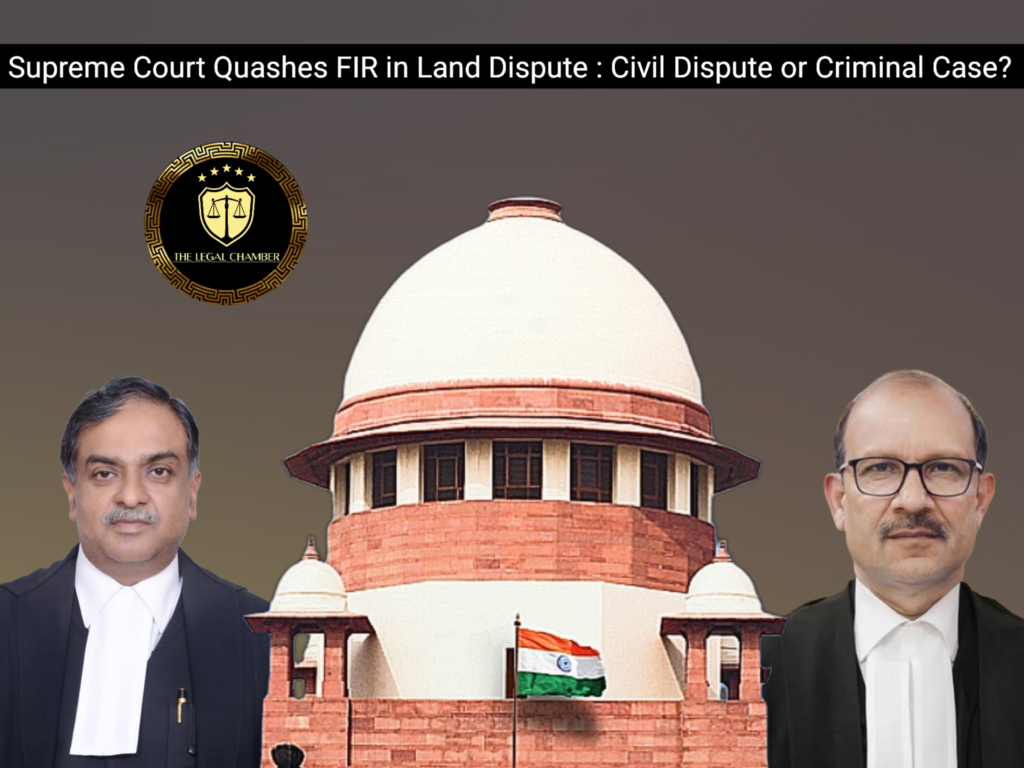
The Supreme Court quashed an FIR under Sections 406 and 420 IPC, ruling that the dispute was purely civil in nature and lacked criminal intent. The Court condemned the misuse of criminal proceedings to pressure the appellants in a land deal, imposing ₹10 lakh costs on the complainant for abuse of legal process. It emphasized that contractual breaches must be resolved through civil remedies, not criminal prosecution, unless fraudulent intent is clearly established. The judgment reaffirmed the need for courts to prevent harassment via frivolous FIRs in commercial disputes.
Facts Of The Case:
The case involved appellants Mala Choudhary (a 70-year-old widow of an Army officer) and her daughter, who owned a 500-square-yard plot in Telangana. In 2020, they orally agreed to sell the land to a complainant linked to a construction firm, with a staggered payment plan: Rs. 5.75 crore if paid by October 7, 2020, increasing to Rs. 7.5 crore if delayed beyond November 7, 2020. The complainant paid Rs. 4.05 crore via banking channels but failed to pay the full amount. Later, he accused the appellants of cheating, claiming an additional Rs. 75 lakh was paid in cash—an allegation the appellants denied. When the deal collapsed, the complainant filed an FIR alleging fraud (Sections 406/420 IPC) and pressured the appellants, leading to the elderly Mala Choudhary’s arrest and eight-day custody. The High Court dismissed their plea to quash the FIR without examining merits. On appeal, the Supreme Court found the dispute purely civil, noting contradictions between the FIR and the complainant’s civil suit for specific performance. It quashed the criminal proceedings, condemned the misuse of the legal process, imposed Rs. 10 lakh costs on the complainant, and granted the appellants police protection in Telangana.
Procedural History:
The case originated with the registration of FIR No. 771 of 2020 at Gachibowli Police Station, Cyberabad, under Sections 406 (criminal breach of trust) and 420 (cheating) IPC, based on a complaint alleging fraud in a land deal. The appellants, Mala Choudhary and her daughter, approached the Telangana High Court under Section 482 CrPC seeking quashing of the FIR and subsequent criminal proceedings. However, the High Court disposed of their petition in a cryptic order (April 28, 2023) without addressing the merits, merely permitting them to seek exemption from personal appearance under Section 205 CrPC. Aggrieved, the appellants filed a Special Leave Petition (SLP) before the Supreme Court under Article 136 of the Constitution, challenging the High Court’s dismissal. The Supreme Court, after examining the facts, held that the dispute was civil in nature and that the FIR was a gross abuse of criminal process. It quashed the FIR and all related proceedings, imposed Rs. 10 lakh costs on the complainant for misuse of law, and directed police protection for the appellants in Telangana. The judgment reinforced judicial safeguards against weaponizing criminal law in contractual disputes.
READ ALSO:Legal Heirs Not Substituted in Time? Supreme Court Explains When Entire Appeal Gets Dismissed
Court Observation:
In its judgment, the Supreme Court made several critical observations while quashing the FIR and related proceedings. The Court emphasized that the dispute was inherently civil in nature, arising from a failed land transaction, and lacked the essential elements of criminal offenses under Sections 406 and 420 IPC. It noted glaring contradictions between the complainant’s allegations in the FIR and his subsequent civil suit for specific performance, which undermined his credibility. The Court strongly condemned the misuse of criminal machinery to arm-twist the appellants, particularly highlighting the unjust arrest and custodial harassment of the 70-year-old appellant, Mala Choudhary. It reiterated that breach of contract or non-performance of an oral agreement, without clear proof of fraudulent intent, cannot be criminalized. The judgment underscored the High Court’s failure to apply judicial scrutiny while dismissing the quashing petition in a perfunctory manner. Additionally, the Court imposed exemplary costs of Rs. 10 lakh on the complainant for abusing the legal process and directed police protection for the appellants to prevent further harassment. The ruling reaffirmed the judiciary’s role in preventing the weaponization of criminal law in commercial disputes.
Final Decision & Judgement:
The Supreme Court allowed the appeal and quashed the FIR No. 771 of 2020 along with all consequential criminal proceedings, declaring them a gross abuse of the legal process. The Court held that the dispute was purely civil in nature, arising from an alleged breach of an oral land agreement, and did not disclose any criminal intent necessary to sustain charges under Sections 406 or 420 IPC. It set aside the High Court’s order for its failure to examine the merits of the case and imposed exemplary costs of ₹10 lakh on the complainant (respondent No. 2) for misusing criminal proceedings to harass the appellants. Additionally, the Court directed police protection for the appellants when visiting Telangana to prevent further intimidation. The judgment reinforced that contractual disputes must be resolved through civil remedies unless clear evidence of criminal fraud exists, safeguarding individuals from vexatious prosecutions. All pending applications were disposed of accordingly.
Case Details:
Case Title: Mala Choudhary & Anr. vs. State of Telangana & Anr. Citation: 2025 INSC 870 Criminal Appeal No.: (Arising out of SLP (Crl.) No. 10748 of 2023) Date of Judgment: July 18, 2025 Judges/Justice Name: Justice Vikram Nath and Justice Sandeep Mehta
Download The Judgement Here